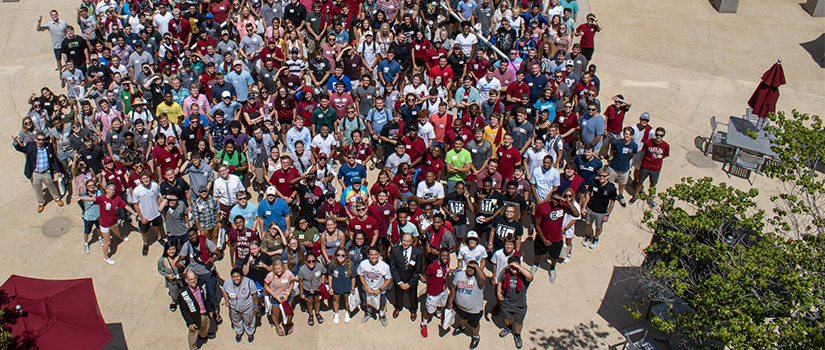Engineering and computing are among the most rapidly growing and evolving occupations. Undergraduate study in the College of Engineering and Computing not only gives you the opportunity to develop knowledge and expertise in an area you are passionate about, it also broadens your social and intellectual horizons and helps you develop the specific skills and habits you need to be successful in in these areas. Match your interests to one of our majors or minors.
Majors in Engineering and Computing:
Aerospace engineering focuses on the research, design, development, construction, testing, science and technology of aircrafts.
Learn more about Aerospace Engineering
Biomedical engineering blends traditional engineering techniques with the biological sciences to create innovative solutions to medical challenges.
Learn more about Biomedical Engineering
Chemical engineers apply the principles of engineering, science and mathematics to solve problems — from the production of alternative fuels to food safety.
Learn more about Chemical Engineering
Civil and environmental engineers plan, design and build skyscrapers and bridges as well as develop complex water and transportation systems while focusing on environmental control.
Learn more about Civil Engineering
Computer engineers design and integrate computer hardware and software systems to create devices such as embedded microcontrollers, sensors, circuit boards and robots.
Learn more about Computer Engineering
Computer information systems professionals integrate knowledge and expertise in software design, communications, economics and management to apply technology to business applications.
Learn more about Computer Information Systems
Computer scientists design and develop the software applications, operating systems and computer architectures that enable our devices to operate.
Learn more about Computer Science
Electrical engineering applies the principles of electricity, electronics and electromagnetics to the flow and transformation of information and energy.
Learn more about Electrical Engineering
Information technology professionals focus on network support and administration, database systems, website design and management, project management, health information technology and innovation and change management. 100% online option available.
Learn more about Integrated Information Technology
Mechanical engineers create, construct and control machines across a broad range of industries including motor vehicles, aircraft and ship construction, propulsion design, power plants, manufacturing and robotics.
Learn more about Mechanical Engineering
Minors in Engineering and Computing:
An undergraduate minor indicates expertise in a discipline either related to or different from your major. Choose from more than 90 minors offered by USC, including eight that are offered by the College of Engineering and Computing, including:
- Aerospace Engineering
- Applied Computing
- Chemical Engineering
- Computer Science
- Cybersecurity Operations
- Data Science
- Electrical Engineering
- Environmental and Sustainable Engineering
- Integrated Information Technology
- Nuclear Engineering
Explore our minors to determine what might be right for you.
Enhance your Degree
Students in the College of Engineering and Computing have many opportunities to apply their skills outside the classroom and even to obtain special certifications or accelerated degrees. Explore the links below to learn more.
- Accelerated Bachelor's/Graduate Programs
- Research Opportunities
- Study Abroad
- Internships
- CEC Student Organizations
- Graduation with Leadership Distinction
Explore Career Paths in Engineering and Computing
While some engineering and computing paths are clear, there are many that are unconventional and even more that are to be discovered. The National Academy of Engineering (NAE) has gathered a report of potential career paths that may not be as obvious.
